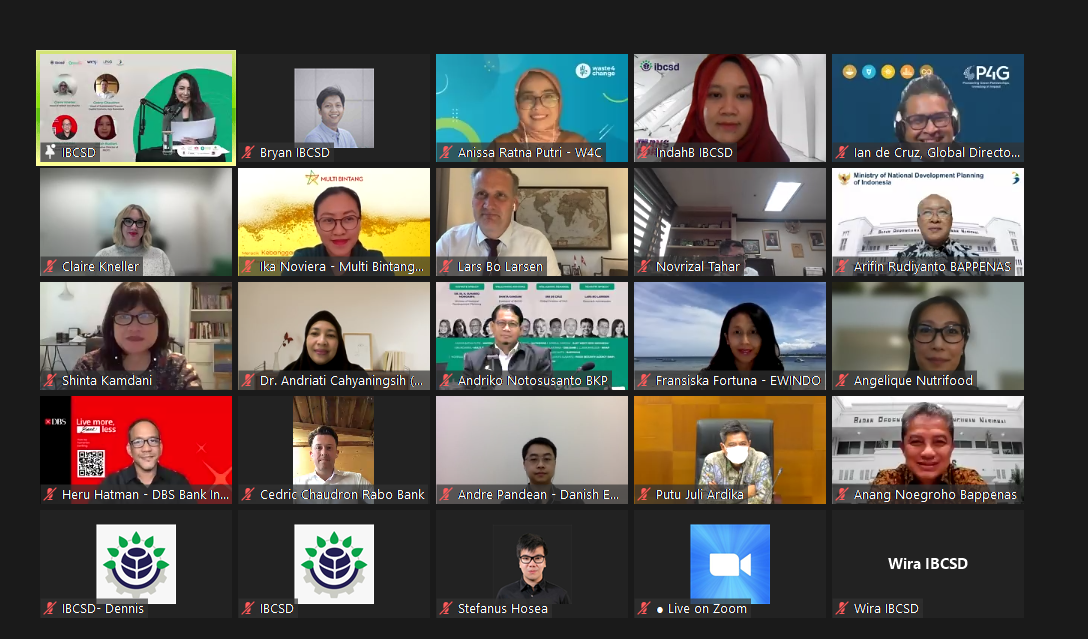Major Corporations in Indonesia Take Action to Reduce Food Loss and Waste

About
On September 8, P4G partnership The Halving Food Loss and Waste by Leveraging Economic Systems (FLAWLESS) launched a Voluntary Agreement in Indonesia bringing together top corporates to act on reducing food loss and waste (FLW). The Voluntary Agreement, GRASP 2030, is a public-private partnership that will implement a Target-Measure-Act-Invest approach to tackling food loss and waste. Eight signatories have signed on to GRASP 2030 including major Indonesian businesses such as East West Seed Indonesia, Multi Bintang and Nutrifood to take tangible action and deliver impact in the form of food loss reduction and savings.
Shinta Kamdani, President of the Indonesia Business Council for Sustainable Development (IBCSD) and P4G National Platform Co-Chair, kicked off the launch by highlighting the private sector’s role in driving a more sustainable food system in Indonesia. Through the Voluntary Agreement, businesses can increase their capacity to manage food waste across their operations.
Through the Target-Measure-Act-Invest Approach corporations commit to FLW reduction targets, measure their waste, take concrete action to produce measurable food loss and waste reduction and monetize these savings through innovative financial products.
P4G Global Director, Ian de Cruz in his introductory remarks shared the economic, social and environmental benefits of this approach and importance of reducing FLW to achieve a net zero future for all. He highlighted the intentional alignment of this partnership with Indonesia’s national priorities and global agendas.
Indonesia loses 4 –5% of its GDP because of food loss and waste. All the food wasted could meet the nutrient needs of 61-125 million people a year. Arifin Rudiyanto, Deputy Minister for Maritime and Natural Resources Affairs, Ministry of National Development Planning (Bappenas) outlined these stark figures as driving reasons behind Indonesia’s commitment to address food and loss waste by strengthening its policies through its Low Carbon Development Initiative. GRASP 2030 complements the government’s plans to strengthen the FLW legal framework and develop food distribution platforms.
Lars Bo Larsen, Ambassador of Denmark to Indonesia, spoke of the different sources of food loss and waste such as in production and transportation in developing countries and in consumption and retail in developed countries. He shared a few solutions Denmark has successfully implemented to address its food waste across the value chain from apps that sell surplus food to Danish cold chain technologies that have reduced post-harvest banana wastage in India by 20%.
Claire Kneller, Head of WRAP Asia Pacific, shared the concrete results Voluntary Agreements have produced in the United Kingdom where a 1.7 million ton reduction in food waste translated to a savings of £4.7 billion pounds and reduced greenhouse gas emissions by 5 million tons. She spoke about the scaling and replication potential of the FLAWLESS model with P4G that has now launched in South Africa and Mexico.
Representatives from banks also attended the launch and shared their interest in partnering with this model. Cedric Chaudron, Head of Sustainable Finance, Rabobank, highlighted how every $1 invested in addressing food waste can yield up to $14 in returns. He also spoke about the bank’s SDG12.3 loan issued to corporates in the Netherlands where if a company meets its FLW reduction targets, it would get rewarded by a margin discount; if it underperforms it would incur a margin premium. He shared how there are similar opportunities to pursue financial products with companies in Asia.
Indah Budiani, Executive Director of IBCSD, underscored how GRASP 2030 presents an opportunity for businesses to determine their priorities for action once waste hotspots are identified. She spoke of IBCSD’s role as a facilitator to collect data and identify actors who can deliver tangible food savings impact.
The different signatories of GRASP 2030 spoke about actions they have already taken to reduce FLW and their commitment to scaling up efforts as part of the Voluntary Agreement. Fransiska Fortuna, General Manager Corporate Affairs, East West Seed Indonesia (EWINDO), a company whose products are used by more than 7 million vegetable farmers spoke about EWINDO’s attempt to reduce post-harvest waste in pumpkin production. The company set a new target of harvesting 20 tons of seeds, a significant increase from its current rate of 1 ton of seeds. It’s also working with farmers to process pumpkins for use in other products such as cans and soups.
Ika Noviera, Corporate Affairs Director, PT Multi Bintang Indonesia, the company that produces Bintang and Heineken beers in Indonesia spoke about their zero waste to landfill target and measures to successfully recycle 97% of beer byproducts.
Adriko Noto Susanto, Head of Food Availability and Reservation Center, Food Security Agency shared his strong support of this private-public collaboration. He mentioned Indonesia’s FLW reduction targets in areas like rice from 20.9% to 11% and outlined tangible steps they were taking to meet those targets, including supplying combine harvesters, changing packaging and providing infrastructure assistance.
More than 160 people attended the launch, which brought together stakeholders from the government, private sector, civil society and investors in pursuit of taking collective action to significantly reduce food loss and waste in Indonesia. As Shinta Kamdani candidly said at the top of the event when she urged all stakeholders to unite and put their full efforts behind tackling this challenge, “There is no Planet B.”
Learn more about the FLAWLESS partnership’s work in Indonesia, Mexico and South Africa here.
